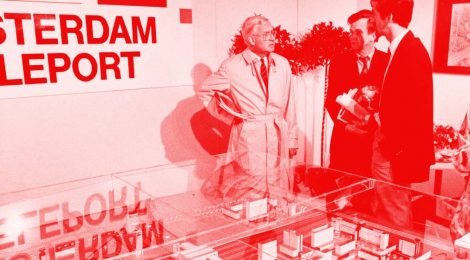
Summer School TU Delft 2018-Aug-21-28
Themes The Connected, Vital and Circulair City in Sloterdijk
Credits 3 ECTS
When From 21st to 28th August 2018
Where Delft University of Technology (NL) with fieldwork in Amsterdam (NL)
Target Group 60 researchers or young professionals and master students in Architecture, Urban Design and Planning, Environmental Design and Sciences, Landscape Architecture, Transport, Infrastructure and Logistics, and related disciplines.
Event website www.ams-institute.org/events/event/summer-school-2018-integrated-mobility-challenges-in-future-metropolitan-areas/
Update February 2019: The book about the results of this Summer School is out!
Stations as Nodes (published by BK Books)
Railway stations have become much more than just a place to get on and off trains. Instead, they are places to work, do business, meet, shop and relax. Cities began seeing them as a ‘Grand Projects’ to boost their image, to serve as a symbol and eye-catching entrance into the city. The development of a station project can be used to promote a high level of architecture and the revitalisation of city areas.
Who and what?
The Amsterdam Institute for Advanced Metropolitan Solutions (AMS), the Delft Deltas, Infrastructures & Mobility Initiative (DIMI), University of Paris-Est and ARENA architectural research network join Delft University of Technology in the organization of the interdisciplinary 2018 Summer School: ‘Integrated Mobility Challenges in Future Metropolitan Areas’. This Summer School is a follow up of ‘Making the Metropolis’ edition held in Amsterdam in August 2017 and the ‘Stations of the Future’ event held in Paris in March 2018. By participating to this Summer School, you will explore interdisciplinary approaches towards a sustainable integration of stations here defined as intermodal nodes. You will deal with the following themes: the role and function of the station in future metropolitan areas, growing number of users, sustainability challenges, programming of transport nodes, public and semi-public spaces (and social dynamics), exploration of alternative, marginal and emerging social uses of stations as meeting places and culture, urban integration and integration in the overall mobility system and urban fabric, accessibility to and from the stations/airport as well as between rail-metro stations and other mobility nodes (e.g. bus, bike and car sharing).
How?
At the main point of intersection between the railway and the city, the station is the central link in the mobility chain as well as a key element in the organization of the intermodal transport. The development of a station project from both a governance and financial perspective can be used to revitalize city areas, to promote a high level of (station) architecture and public spaces, and to adopt new technologies contributing to safety while enhancing the experience of the station users. The main question will be: which approaches and scenarios can be tested and applied to these intermodal nodes, particularly when dealing with lack of space and growing number of users? You will exchange knowledge of sustainable solutions by applying different strategies on Sloterdijk station area. This test-bed and design location is considered as an urban generator for future developments in Amsterdam. Sloterdijk is part of a vast development area called ‘Haven-Stad’.
What you will learn
This summer school is built upon the expertise of five different institutions. Participating in the ‘Integrated Mobility Challenges’ Summer School will advance the adaptability of your own knowledge and skills related to interdisciplinary challenges in the sustainable metropolis. Working on the Sloterdijk station area is more than working on an infrastructural node, it’s about developing a sustainable neighborhood with public and social values. As a neighborhood its development deals with many stakeholders. Keywords are: business-case, commercial and social value, accessibility, livability, safety, inclusiveness, mixed-use, greenery and health. By understanding the fundamental challenges in the Connected, Vital and Circular City (AMS Research Themes), you will be able to create interdisciplinary answers to these challenges.
How you will work
The Summer School ‘Integrated Mobility Challenges’ is organized in a studio-setting. The studios create an interactive setting for you, facilitating disciplinary exchange. Participants are distributed over five sub groups related to major challenges in the Connected, Vital and Circular City. Within the subgroups, you will focus on either: The Connected City (Mobility, Infrastructure and Logistics or Metropolitan Development); The Vital City (Social Interaction and Urban Spaces); The Circular City (Local and Regional Networks, Data and Knowledge Sharing, Business-cases, Resource Security and Buildings as Energy Sources). Each group aims to have twelve members and will be composed interdisciplinary and internationally. As part of one of these groups, you are supervised by at least one expert as well as one appointed professor of a participating institution. Together with the other participants, you will develop design proposals supported by fieldwork, lectures in a seminar setting together with plenary mid-term and final presentations.
Registration & costs
Costs: € 200,– (field excursions, lectures, materials, transfers from Delft to Amsterdam included)*
*researchers and master students in Architecture, Urban Design and Planning, Environmental Design and Sciences, Landscape Architecture, Transport, Infrastructure and Logistics, from ARENA Research Network, University of Paris-Est, Delft University of Technology, Wageningen UR and MIT Boston can participate free of charge.
Main venue
Delft University of Technology Faculty of Architecture and the Built Environment, Julianalaan 134, 2628 BL Delft
Venue in Amsterdam
Amsterdam Institute for Advanced Metropolitan Solutions (AMS) at Royal Tropical Institute in Amsterdam Mauritskade 62, 1092 AD Amsterdam
More information about the previous events:
www.ams-institute.org/making-the-metropolis/
www.ams-institute.org/news/stations-of-the-future-march-15-16/
Contact
Send your application or enquiries to:
Joran Kuijper
j.a.kuijper@tudelft.nl
Application
Application deadline: June 21st 2018.
Application should include: full name, email address, cell phone number, university, faculty, study programme (incl. field of discipline); CV and a motivation letter (maximum of 100 words).
Admission will be based on evaluation on CV and motivation letter.
Shortly after the 21st of June you will hear if you are granted to participate.
Organising Committee
dr.ir. Manuela Triggianese
dr.ir. Roberto Cavallo
ir. Joran Kuijper
prof.dr. Nacima Baron
dr.ir. Maurice Harteveld
drs.ing. Hans de Boer
Scientific Committee
dr.ir. Manuela Triggianese (TU Delft, AMS)
prof.dr. Nacima Baron (University of Paris-Est)
dr.ir. Roberto Cavallo (TU Delft, ARENA)
dr.ir. Maurice Harteveld (TU Delft, AMS)
prof.ir. Kees Kaan (TU Delft, AMS)
prof.dr.ir. Marcel Hertogh (TU Delft, DIMI)
prof.dr. Urs Hirschberg (TU Graz, ARENA)
prof.dr. Bernard Kormoss (ULiège, ARENA)
prof.dr.ir. Arjan van Timmeren (TU Delft, AMS)

